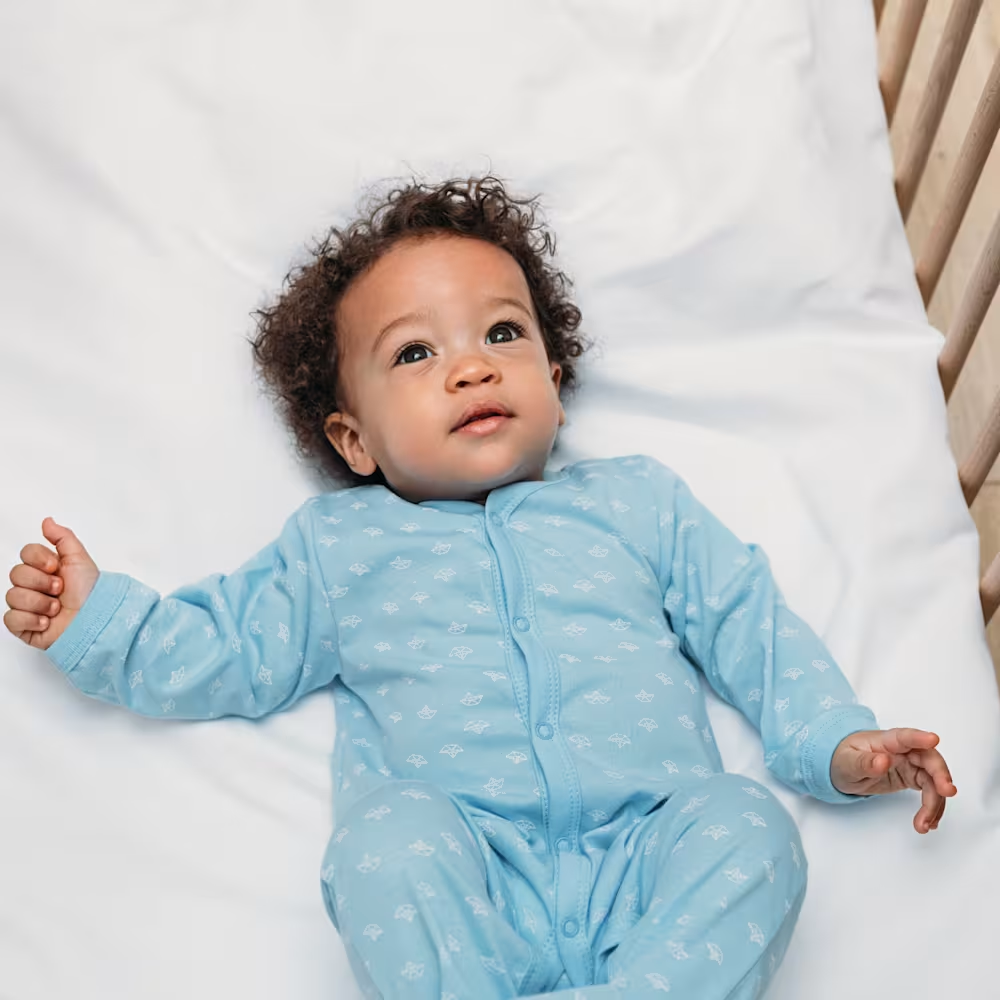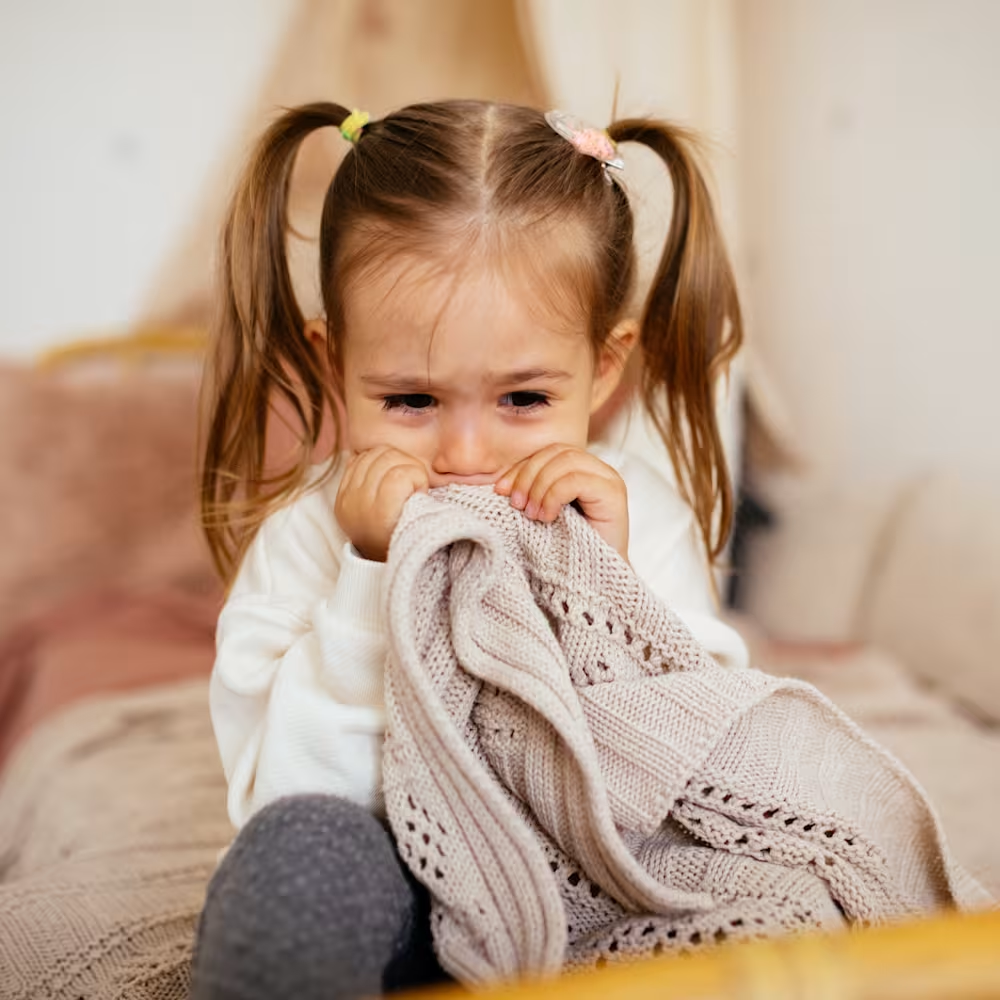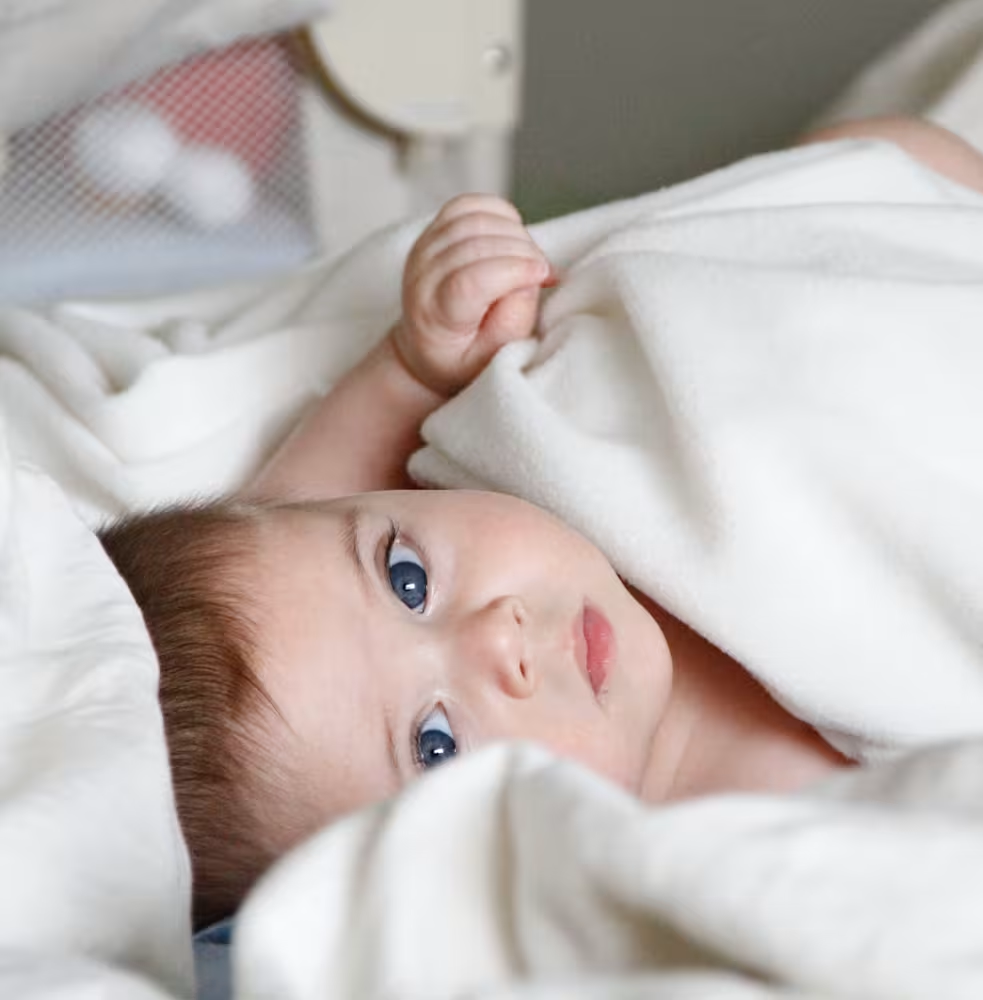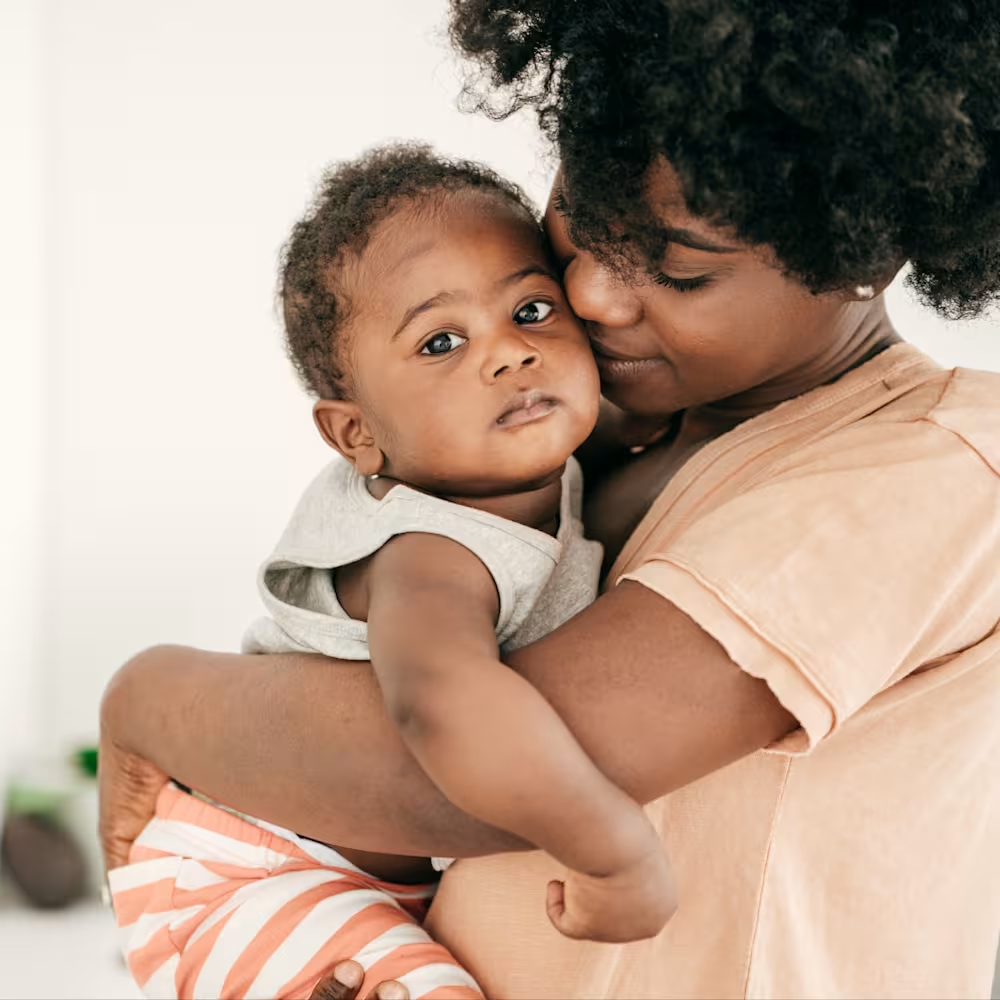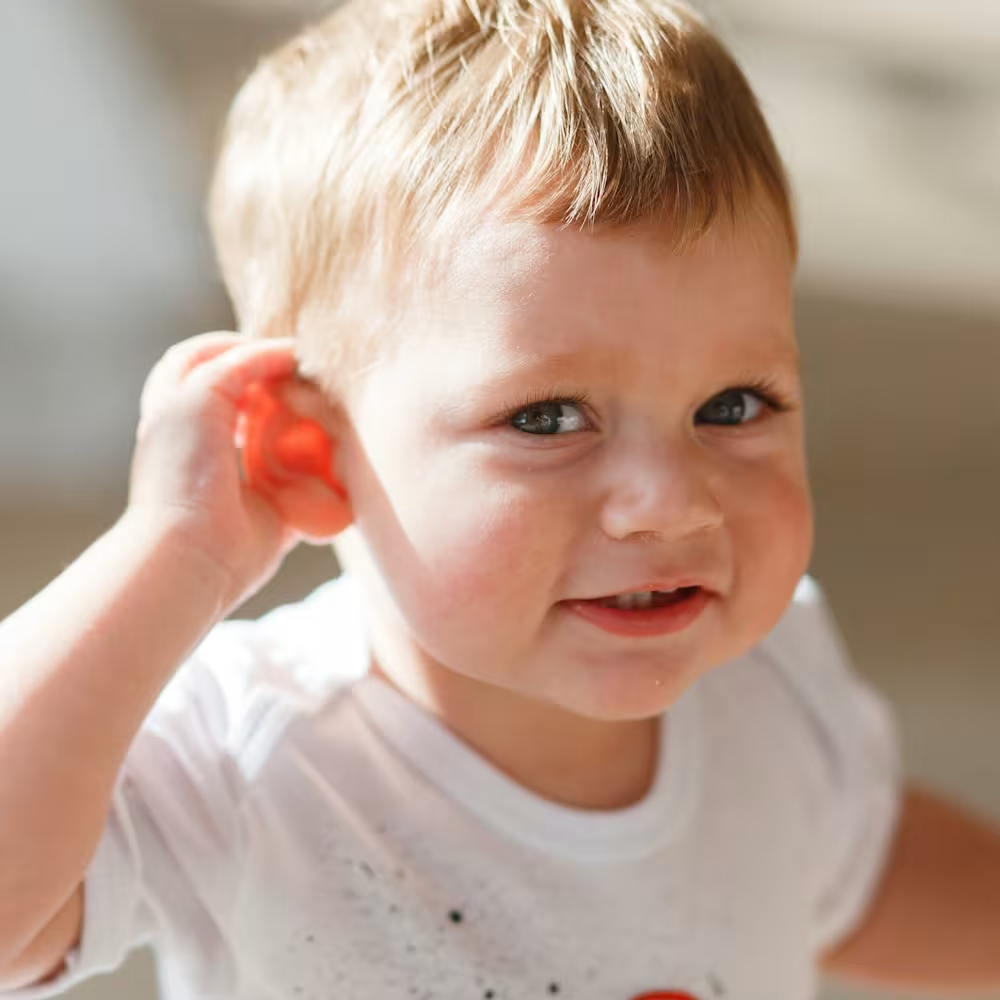Baby grunting and other sleep sounds: Tips for better rest
Updated Dec 29, 2025

No matter how prepared you are, there are so many things that people never warn you about before having a baby. One of those surprises: how much noise sleeping babies make at night. Sure, you likely expect your baby to make some sounds at night — but not while they’re sound asleep. Instead of “sleeping like a baby” it may sound like your little one is a barnyard animal as they grunt, snore, moan, and gurgle while they snooze. The range of infant sleep sounds can be surprising (and alarming) for parents, but they’re common and typically aren’t cause for concern.
Should I be concerned if my baby grunts while sleeping?
Most of the time, your baby's grunting is perfectly normal — and it likely won’t be the only noise you overhear as your infant sleeps. Throughout the night, you may also hear your noisy sleeper making a range of other normal baby sounds including snoring, whimpering, smacking their lips, and crying out. They may come on suddenly with a random shriek at night or pop up as cycles of moaning. The symphony of crib-side sounds may make you feel like you’re sleeping (or trying to sleep) near a baby dragon.
They can also make it sound like your baby is distressed, especially when you hear a grunt or gurgling from a dark crib. Although these infant sleep noises may initially seem alarming, they're expected from our smallest sleepers. Typically, they don’t indicate a health concern — or even that your little one is awake.
What are common sleep sounds that newborns make?
It may be surprising how much noise can come from such a little sleeper. But baby sleep sounds are common [] and can include:
Grunting
Snoring
Whimpering
Sighing
Snorting
Smacking lips
Hiccuping
Rattling/whistling
Gurgling
Irregular breathing []
Moaning and crying out
Reasons babies make noises while sleeping
Developmental factors
Infants are rapidly growing, and part of that is the development of their respiratory and digestive systems. As your little one puts in the work learning to regulate these systems, you may even hear it. From periods of irregular breathing to strange sounds, these noises are part of the maturing process and usually are no reason for alarm.
They’re working out some extra fluid
If you notice your newborn grunting in sleep or making sleep sounds shortly after they’re born, it may be from extra fluid in their nose. Newborns may have nasal swelling or some extra fluid stuffing up their little noses after birth.
They’re nose breathers
Newborns are obligate nasal breathers [] and typically breathe through their noses instead of for the first few months of life. Since their nasal passages are so tiny, it only takes the slightest bit of mucus, milk, or formula to clog them. For this reason, it’s common for babies to sound congested, even if they don’t have a cold.
They experience “periodic breathing”
As your infant is asleep, you might notice episodes where it seems like they stopped breathing and then suddenly tried to catch up for it with rapid breaths. This is called normal periodic breathing of infancy [], and although it can seem scary, as the name suggests, it’s completely normal. This periodic breathing happens in cycles: a baby may stop breathing for 5 - 10 seconds, followed by a bout of quick breathing with 50 - 60 breaths a minute for 10 - 15 seconds. Then, breathing returns to normal until the pattern starts over again. However, always contact your child's healthcare provider if you're concerned about their breathing in general.
Their sleep cycles are different
Newborn sleep patterns differ from adults: They’re shorter with more time spent in REM (or active) sleep. It’s during this stage when babies experience periodic breathing, so it’s common for babies to stop breathing for a few seconds before restarting with a sudden burst of fast breaths. Things quiet down during the later stages of sleep when breathing is more regular. But unlike kids or adults, newborns spend about half the time in REM sleep [] and less time in non-REM (or quiet) sleep.
Babies' overall sleep cycles are also shorter — typically 50 minutes [] for a 3 month old compared to 90 minutes for adults — so they have to connect cycles more frequently. Young babies tend to have a harder time doing this, and they may cry out as they transition from deep sleep back to light sleep or fully wake up.
Their digestive systems are working
You may also hear a symphony of nighttime noises that have nothing to do with your baby's breathing. Instead, these gurgles and bubbles come from your little one's tummy and still-developing digestive system. It's working just as hard while they're sleeping, so you may hear everything from sloshing digestion to gas or hiccups from reflux.
Babies are also notoriously noisy poopers as they learn how to relax their pelvic floor and use stomach muscles to push out stools. Also known as grunting baby syndrome or infant dyschezia [], this vocal pooping isn’t cause for concern and typically resolves within the first few weeks of life. It can happen (even in their sleep) as a baby learns the muscle coordination needed to poop. Although it may seem distressing, little ones aren’t usually in pain — the cries are just helping them create the abdominal pressure needed for a bowel movement.
They’re getting hungry
From lip-smacking to suckling, little ones aren't always subtle (or quiet) when hungry — even if they’re asleep. Most infants between 0 - 2 months need to , and it’s uncommon for babies younger than 6 months to go all night without eating. As they gear up for that midnight snack or early morning meal, your baby’s body may start signaling that they’re getting hungry and mealtime is approaching.
Tips for helping noisy babies sleep more peacefully
Tip | Why it helps | How to put it into practice |
|---|---|---|
Use a humidifier or air purifier | Moist air and cleaner air can ease congestion, making breathing (and sleeping) quieter for little ones. | Run a cool-mist humidifier at night or try a short steam session before bed. An air purifier can help clear dust and odors. |
Try saline or gentle suction | Clearing the nose reduces noisy breathing caused by dried mucus or milk. | Use a couple saline drops to loosen debris, then gently suction with a bulb syringe or similar tool before sleep. |
Create a soothing, safe sleep space | A calm, safe environment helps babies fall asleep easier and stay asleep through normal sleep-cycle noise. | Keep the room dark, cool (68 - 72° F), and use steady sound like white noise, and follow safe sleep guidelines. |
Keep your baby well hydrated | Hydration can thin mucus and support easier breathing while also helping babies feel full and settled. | Offer breast milk or formula regularly (and water, if 6+ months). Monitor their intake, especially during illness or dry weather. |
Find more details below:
Tip #1: Use a humidifier or an air purifier
If your baby’s loud sleeping is due to congestion, using a cool-mist humidifier or vaporizer in the room can help keep their nasal passage clear. A steam treatment before bed (where they breathe in steamy air in the bathroom) can also help with plugged-up little noses. You can also consider using an air purifier, which cleans the air by removing air particles (including dust and strong smells that can also cause congestion or sneezing).
Tip #2: Try saline or gentle suction
Before your little one goes to bed, try clearing any dried mucus or milk from their nasal passages. Just can help loosen things. Then, you can gently suction out mucus with a bulb syringe (or any other similar snot-sucking tool on the market).
Tip #3: Create a soothing (and safe) sleep environment
To help your baby fall asleep and stay asleep, aim to create an environment conducive to sleep. To help encourage sleep, you can try:
Making the room dark: We recommend keeping the bedroom very dark for sleep times once your little one is beyond the day/night confusion stage (this usually resolves by eight weeks of age). Consider adding , blinds, or curtains to help darken the room as much as possible.
Adjusting the temperature: Aim for a cool yet comfortable room temperature, which can help promote sleep, prevent overheating, and reduce the risk of SIDs. Although it depends on your child’s comfort, the recommended temperature is between 68° and 72°F [] for sleep.
Using a sound machine: Whether you use or soothing nature sounds, the continuous background noise can help block out household sounds and lull your little one back into a deep sleep as they connect sleep cycles.
Whether your little one is a noisy sleeper because of a stuffy nose or just going through a grunting phase, always follow safe sleep practices. Although it may be tempting to elevate your baby to help them sleep if they sound congested, the AAP [] recommends sticking to a firm, flat surface and placing your baby on their back. You can also help minimize the risk of breathing-related sleep issues by keeping their crib clear of items like blankets, pillows, stuffed toys, and bumper pads.
Tip #4: Ensure your little one is hydrated
Aim to keep your little one well-hydrated with formula and/or breast milk (and water if baby is over 6 months). Focusing on hydration positively impacts their overall health, even if your child isn't sick. It also promotes sleep by:
Loosening and thinning mucus [], making it easier for babies to breathe, especially during sleep times
Keeping them feeling full — hungry babies have a hard time falling asleep and staying asleep
Helping regulate body temperature
When do babies stop making sleep noises?
It's developmentally normal for your baby to make noises during sleep and these sounds don't always indicate a problem. Just like the precious, babies outgrow some of the sleep sounds within the first few months and continue to quiet down at night as their sleep cycles mature and develop. Other sounds may take longer to resolve depending on the cause:
Nasal obligate breathing: Babies typically breathe exclusively out their noses (unless they are crying) until they are around 3 - 4 months old, when they develop the reflex to breathe out of their mouths.
Periodic breathing: These episodes of irregular breathing [] are most common during the first 2 - 6 weeks and generally resolve by 6 months old
Infant dyschezia: This straining, grunting, and seemingly struggle to poop [] (even if your baby isn’t constipated and is asleep) tends to resolve within the first week or two
Hiccups: It’s common for babies to hiccup a lot, but it tends to resolve between 6 months to a 1 year []
When to seek professional help
Although it’s common for babies to grunt and make a range of noises in their sleep, always mention any concerns to your medical provider. The AAP [] also recommends calling your baby’s doctor if:
They’re breathing much faster than normal
Their lips or face turn bluish when they cough
Their nonstop coughing is keeping them from sleeping
They stopped breathing for longer than 10 seconds
The AAP also suggests calling 911 (or other emergency number) if your baby:
Is struggling with each breath
Can barely make sounds or cry
Has bluish lips or face
Seems to have something caught in their throat
Moaning or grunting noises with each breath
Other signs that indicate your baby is potentially working too hard to breathe:
Nasal flaring: Their nostrils are widening [] with each breath
Retractions: The chest is pulling in, especially around the collarbone and ribs, with each breath
Barking or wheezing
In most cases, noisy breathing while sleeping is not a cause for concern. However, noisy breathing and sleeping may also be symptoms of a cold, flu, RSV, etc. If you notice any other flu-like symptoms accompanying these noises, reach out to your child’s healthcare provider. Sometimes, noisy sleeping may occur due to different health issues like:
Laryngomalacia
Laryngomalacia [] is a congenital softening of the larynx tissues (voice box). It occurs when the laryngeal structure is malformed and this floppy tissue falls over, partially blocking the airway. Little ones with laryngomalacia make high-pitched, squeaky sounds and it’s the most common cause of infant stridor [] or noisy breathing due to an obstructed or narrow airway. However, it’s not a serious condition and most infants outgrow it without surgery by 18 to 20 months old.
Sleep Apnea
Although sleep apnea is most common in adults, it can also affect any age group and is more common in premature babies than full-term newborns. Research shows it occurs in 50% of babies born between 33 to 35 weeks and in nearly all infants delivered at less than 28 weeks []. Although treatment for infant sleep apnea depends on the cause and severity, most preterm babies outgrow symptoms by the time they reach 44 weeks after conception. However if symptoms don’t resolve, an underlying medical condition that requires treatment may be the cause. Signs of obstructive sleep apnea (OSA) and central sleep apnea (CSA) in babies include []:
Pauses in breathing that last at least 20 seconds
Snoring
Labored breathing
Mouth breathing
Gastroesophageal reflux (GERD)
Some healthy babies have infant reflux or gastroesophageal reflux [16] (GER) and spit up multiple times a day. It’s common in infants because of their liquid diet and the time spent laying on their backs, and symptoms typically resolve by 9 - 12 months old []. However, gastroesophageal reflux disease (GERD) [] is a more serious form of GER and signs can include:
Breathing problems (e.g. wheezing, ongoing cough, or trouble breathing)
Coughing or wheezing so much that it wakes them up
Hiccups
Takeaway
Babies can be tiny little sound machines and make various noises as they sleep. It's typically normal for newborns and infants to make a symphony of nighttime sounds, including grunting, moaning, snoring, crying, and hiccuping, all while asleep.
Babies make noises in their sleep due to a variety of developmental and physical factors including: being nasal obligate breathers, having different sleep patterns, and having immature digestive systems.
If your baby is congested, you can help them sleep more peacefully by using a humidifier, air purifier, saline drops, or gentle suction. Creating a soothing sleep environment and ensuring your little one is well-hydrated can also help promote sleep.
Babies typically outgrow their grunting and sleep sounds over their first year.
Although it's normal for babies to make noises while sleeping, always contact your baby's medical provider if you have any concerns about their breathing or overall well-being.
The AAP also suggests calling 911 if your baby:
Is struggling with each breath
Can barely make sounds or cry
Has bluish lips or face
Seems to have something caught in their throat
Share article:
Note: The content on this site is for informational purposes only and should not replace medical advice from your doctor, pediatrician, or medical professional. If you have questions or concerns, you should contact a medical professional.
18 Sources
Share article:
